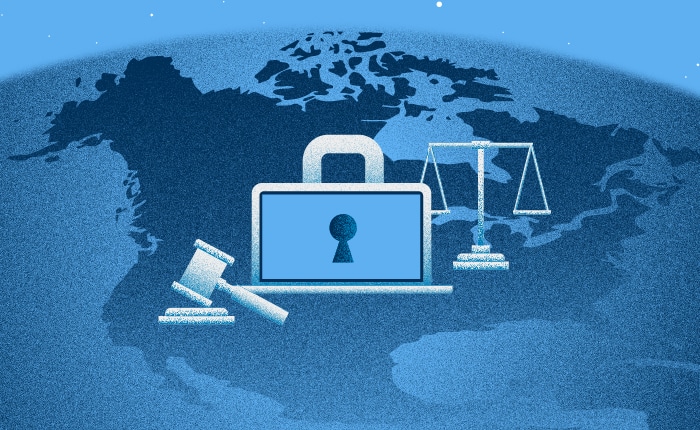Kicking off with Understanding Data Privacy Laws, this topic delves into the crucial aspects of data privacy regulations in the digital realm. From the significance of these laws to the repercussions of non-compliance, get ready to explore it all in a way that’s both informative and engaging.
Get ready to dive into the world of data privacy laws and discover why they matter more than ever in today’s interconnected digital landscape.
Overview of Data Privacy Laws

In today’s digital age, where personal information is constantly being shared and stored online, data privacy laws play a crucial role in safeguarding individuals’ sensitive data. These laws are designed to protect the privacy and security of personal information, ensuring that it is not misused or exploited by companies or individuals without consent.
Importance of Data Privacy Laws
Data privacy laws are essential for regulating how organizations collect, use, and share personal information. By establishing clear guidelines and standards for data protection, these laws help prevent data breaches, identity theft, and unauthorized access to sensitive information. Additionally, data privacy laws promote transparency and accountability, holding companies accountable for how they handle and process individuals’ data.
Key Objectives of Data Privacy Laws
– To establish rules for the collection, storage, and processing of personal data.
– To provide individuals with control over their own personal information.
– To ensure the confidentiality and security of sensitive data.
– To prevent the unauthorized use or disclosure of personal information.
Protection of Personal Information
Data privacy laws protect individuals’ personal information by requiring companies to obtain explicit consent before collecting and using data. These laws also mandate the implementation of security measures to safeguard data from cyber threats and unauthorized access. By giving individuals the right to access, correct, and delete their personal information, data privacy laws empower individuals to control how their data is used and shared.
Common Data Privacy Regulations: Understanding Data Privacy Laws
Data privacy regulations play a significant role in protecting individuals’ personal information and ensuring companies handle data responsibly. Two major data privacy regulations that have garnered attention are the General Data Protection Regulation (GDPR) and the California Consumer Privacy Act (CCPA).
GDPR
The GDPR is a European Union regulation that aims to give individuals control over their personal data and simplify the regulatory environment for international business. Companies that process personal data of EU residents must comply with GDPR requirements, such as obtaining explicit consent for data processing, implementing data protection measures, and notifying authorities of data breaches.
CCPA
On the other hand, the CCPA is a state-level regulation in California that grants consumers more control over the personal information that businesses collect about them. It requires businesses to disclose the types of data collected and allow consumers to opt-out of the sale of their information. The CCPA also imposes data security obligations and provides consumers with the right to access and delete their data.
Comparison and Contrast
While both GDPR and CCPA focus on protecting individuals’ data privacy rights, there are key differences between the two regulations. GDPR is a comprehensive regulation covering all EU member states, while CCPA is specific to California. GDPR has stricter requirements for obtaining consent and data processing, while CCPA emphasizes consumers’ right to opt-out of data selling.
Examples of Compliance
Companies around the world have been working to comply with GDPR and CCPA to avoid hefty fines and maintain consumer trust. Some common compliance measures include updating privacy policies, implementing data protection measures, conducting regular audits, providing data access to consumers upon request, and appointing data protection officers to oversee compliance efforts.
Implications of Non-Compliance

Non-compliance with data privacy laws can have serious consequences for companies and organizations. It can lead to legal actions, financial penalties, loss of reputation, and even the closure of the business.
Legal Actions and Penalties
- Companies can face fines and penalties for not complying with data privacy laws. For example, in 2019, British Airways was fined $230 million for a data breach that exposed the personal information of half a million customers.
- In 2018, Facebook faced a $5 billion fine from the Federal Trade Commission for violating users’ privacy rights in the Cambridge Analytica scandal.
- Individuals affected by data breaches can also take legal action against companies for not protecting their personal information, leading to costly lawsuits and settlements.
Financial Impact
- Non-compliance with data privacy laws can result in significant financial losses for businesses. Apart from fines and penalties, companies may also incur costs for investigations, legal defense, and implementing corrective measures.
- Moreover, the loss of customer trust and damage to reputation can lead to reduced sales, loss of business partnerships, and ultimately impact the overall profitability and sustainability of the organization.
- Studies show that companies that experience data breaches and fail to comply with privacy regulations often suffer long-term financial consequences, including stock price declines and decreased market value.
International Data Transfers
When it comes to international data transfers, data privacy laws play a crucial role in ensuring the protection of individuals’ personal information. These laws regulate how data can be transferred across borders and dictate the measures that companies must take to safeguard data privacy.
Privacy Shield Mechanism, Understanding Data Privacy Laws
The Privacy Shield framework was established to enable the transfer of personal data from the European Union to the United States in compliance with data protection requirements. Companies that adhere to Privacy Shield principles demonstrate their commitment to protecting individuals’ data privacy rights.
Challenges in Data Transfers
- Legal Variations: Companies often face challenges due to differences in data privacy laws across countries, making compliance with multiple regulations complex.
- Data Security Risks: Transferring data across borders increases the risk of data breaches and unauthorized access, posing a threat to individuals’ privacy.
- Compliance Costs: Ensuring compliance with various international data transfer regulations can be costly for companies, especially those operating globally.
